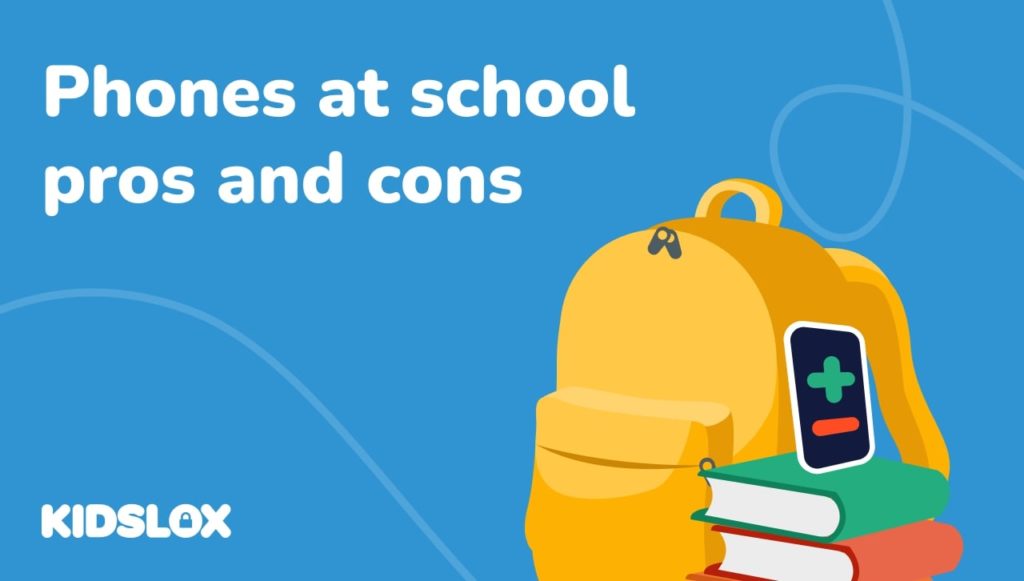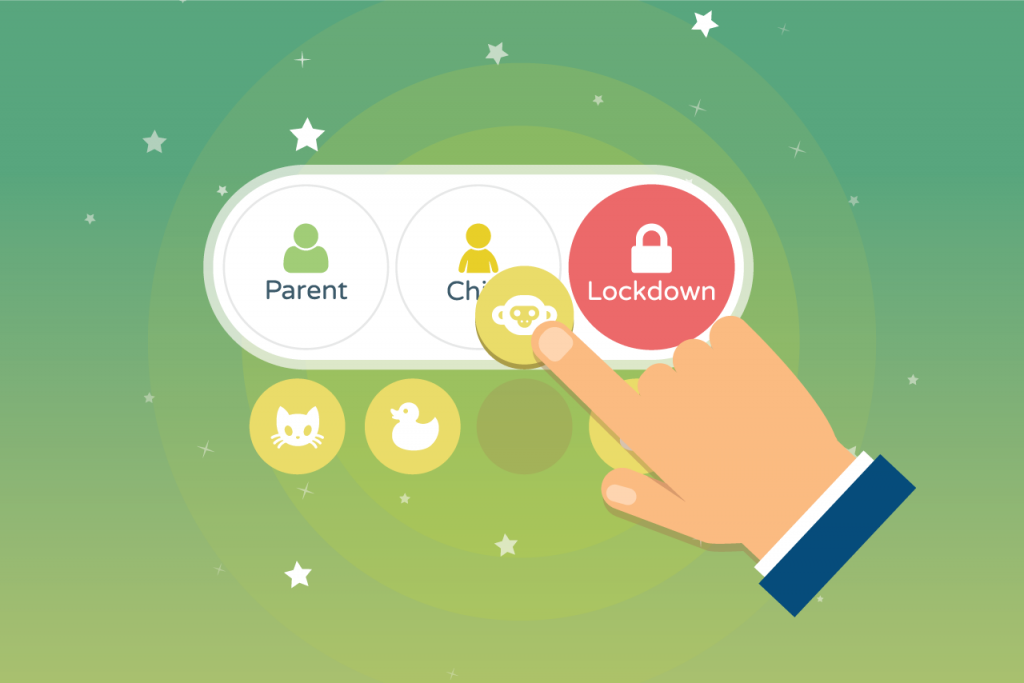The debate about the positives and negatives of cell phones in the classroom is a fierce one.
Like it or not, cell phones are a fundamental part of modern teen life. Research estimates that up to 95% of U.S teens have access to a smartphone, and 45% say they are ‘almost constantly’ on the internet.
With shock statistics like that, it’s no wonder that so many educators, parents – and children themselves, are worried about the consequences of bringing phones to school. In an environment that should be all about learning, there’s fierce debate about the pros and cons of cellphones at school.
Like all issues regarding kids and our ever expanding digital world, it’s often about weighing up the advantages and disadvantages of bringing a cell phone to school, and making an individual decision about what’s best for your family. Let’s explore more.
Facts about cell phones at school
The fact of the matter is, a lot of teens are bringing their cell phones to school whether it’s against the rules or not. In fact, it’s thought that up to 95% of U.S teens take their cell phone to school. Shockingly, 92% admitted that they’d used their cell to text in class, and 10% even admitted to having texted during an exam. (Tindell and Bohlander, 2012).
The power that cell phones hold to distract teens isn’t limited to High School kids either, studies on the impact of cell phone use on U.S college students found that the more time a student spent online, the more sedentary they were. Perhaps even more tellingly, researchers Jacobsen and Forste (2011) reported a lower GPA (grade point average) in those students who spent a lot of time online.
What are the pros to cell phone use in school?
Some of the facts about cell phone use in class might be enough to get you to confiscate your teen’s device when they’re learning but what, if any, are the positives to having a cell phone at school?
Whether you agree with it or not, there are a number of pros to children taking their cell phones to school. Let’s take a look at some of the positives for bringing a phone into the classroom.
1. Personal safety and helping them to stay in touch
Being able to get in contact with your child easily and quickly is undoubtedly one of the biggest positives to having a cell phone at school. If you haven’t heard from them, or you need to update your plans for pick-up, the wonder of modern technology allows you to send a simple text or call.
If your child is a little older and has some independence, having their phone to contact friends about after school plans, letting them know of any last minute changes, delays, or exact meeting points are all major benefits to having a cell at school.
2. In case of emergencies
If there’s an emergency, or your child is in danger, being able to make a call because they have a cell on them to call for help can be a lifeline. Likewise if something happens in your family and you need to get in touch, having a cell phone at school just adds that extra layer of personal protection to keep them safe.
3. Location, location, location
Tracking your child’s location and being able to pinpoint their exact whereabouts is another major positive for having a cell phone at school. If your child wanders from where they’re supposed to be, or you haven’t heard from them for a while, being able to spot check their location to ensure they’re safe is a definite pro to having a cell phone at school. Enabling Family Link on Android, and Family Sharing on iPhone can help you to set this up with your own kids.
4. Managing anxieties and children with additional needs
Not all children are confident and outgoing at school. Some may have anxieties about being away from their parents, or might feel uncomfortable and distracted if they don’t know the plans ahead of them. For those who take public transport to school, having that extra layer of security and the ability to check on timetables can be a real comfort.
Having a cell phone at school to provide reassurance for more nervous children, or ones who have special educational needs, is a great way to have a line to them to manage anxieties and give them that added confidence boost that will enable them to focus better on their school work.
5. Opportunities for learning
Cell phones are about so much more than simple communication. With a smartphone, your child has a world of answers at their fingertips. This ever-expanding encyclopedia is excellent news for the ever-curious, vociferous learners who want to learn more. Cell phones can be brilliant learning tools within the classroom, helping students research and delve deeper into a topic.
If your child wants to learn more about what they’re working on, or has unanswered questions about a class, having their cell phone handy to Google information is a definite positive to phones at school.
This is also a positive benefit for children who perhaps aren’t as confident to speak out in class, or aren’t as comfortable with learning. Having their cell phone at hand at school in order to check things before they speak, or share, can give them the added confidence boost they need to keep grades up.
6. Social learning and friendship benefits
No one wants their child to spend all day on social media apps, but there are certain platforms that can be used for education as well as fun. Connecting with classmates in forums and chat groups about study and homework is a great pro to having a cell phone at school. Perhaps there are study groups that share answers, research and ideas through messaging apps, or private social groups on Facebook or similar for certain subjects. That’s all a plus to having a phone at school.
7. Record now and revise again later!
Note taking has had a 21st Century makeover in the form of voice notes and video recording through cell phones. It might not always be appropriate, or within school guidelines, but If it’s allowed by the teacher, what better advantage to having a cell phone in the classroom, can there be than the ability to capture their lessons to learn more later? Children are able to record and rewatch their lessons at a later date – perfect for revision time when exam season rolls around.
8. Learning balance and life skills
Let’s face it, the popularity of cell phones and social media platforms isn’t showing any signs of slowing down. One day, the children and teens in the classroom right now will be the ones filling our offices and crucial services. And, when it comes to the world of work, teens will need to find the self-discipline to balance checking their cell against getting their job done!
Having cell phones in the classroom gives children a positive opportunity to learn and develop life skills that will enable them to manage their screen time and how to balance and manage the time they spend online.
There are lots of advantages to children taking their cell phone to school. With careful management, and clear guidelines, it can be something that promotes learning, personal safety and socializing.
But there are cons.
What are the disadvantages of children taking cell phones to school?
Nothing is completely positive, and cell phones at school are no exception. With every opportunity to learn comes an opportunity to be distracted. Here are some of the most common reasons why cell phones aren’t a good idea in the classroom.
1. They’re a huge distraction
From gaming to sexting, cell phones come hand-in-hand with lots of distractions that just aren’t appropriate for the learning environment and school. Texting people in class, sharing memes, gaming, listening to music and even sneaking a peek at YouTube, there are endless opportunities for children to be distracted with their cell phone at hand in the classroom. Undoubtedly, this is one of the major worries and biggest cons of having a cell phone at school. Many educators ask for, and ban, the phone within the classroom and ask that they are turned off and indeed in(!) at the start of class.
2. Cell phones can be a channel for bullying
Unfortunately, there’s a nefarious type of bullying that comes along with the rising popularity of the smartphone – cyberbullying.
What once might have been a pulled ponytail or nasty note shared in class has evolved into a much more insidious pattern of behavior that’s being witnessed in schools around the world. In fact, the European Commission’s Joint Research Center found that 50% of 10-18 year olds had experienced cyberbullying at least once.
Cyberbullying is a major concern for parents and educators. Teachers report that cyberbullying is the number one safety concern in their classrooms according to a Google survey (January 2019).
The reality of having cell phones in the classroom means that embarrassing pictures, nasty messages and name-calling can happen where the teachers can’t see, and it’s one of the biggest reasons why many parents want cell phones to stay out of the classroom.
3. Digital addictions and mental health concerns
Since smartphones burst into our lives on a grand scale over a decade ago, incidences of teen depression have risen 50%. Many parents and teachers believe that the classroom should be a place of regular and routine break from the relentless digital lifestyles many children and teens are forced to live.
Banning phones in the classroom gives a really great opportunity for children to reset and take a well-needed break from their device. Many educators advocate that cell phones stay in the locker for the day and only be used at breaks, recess and when parents and caregivers need to be contacted.
4. Cheating in exams and learning the wrong way
It’s hardly surprising that some teens can’t resist the lure of Google – especially if too much screen time has been slowly eating into the time they should have spent on studying and they’re falling behind. And, for some, the ability to just look online for answers instead of spending time researching and learning things the hard way, can stop them from deep learning on a subject.
The ability to have a cheat sheet in your pocket is not only risky (the consequences of cheating in tests are never good), but it’s not fair. Cheating is not an accurate representation of a child’s academic ability, it’s also unfair for the students who have studied and followed the rules.
So, what’s the answer to the cell phones in school debate?
Most of us can agree that the addictive nature of cell phones, and the instant access to games, videos and social apps that they give, provides a lot of distractions for children in the classroom. Fears over cyber bullying, and the relative ease of cheating in exams, are all major cons to bringing cellphones to school.
However, modern life often requires us to have cell phones. From banking to checking when the next bus will arrive, smartphones are our link to the world around us. And, when it comes to our children, ensuring that they have a way to feel safe, can call for help, update on their movements, and to be able to check where they are, are all major benefits to having cell phones at school.
For many, these convenience and safety positives outweigh the potential downsides. With careful management of the device, ensuring children follow school policies, and educating children about the importance of being responsible and mature with their cell phone is fundamental to not letting the disadvantages outweigh the positives of bringing cell phones to school.





